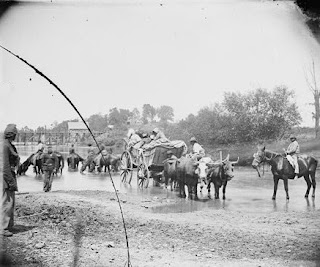
Fleeing slaves
Reading Southern planters' journals from the antebellum days offers some insights into the functioning of the Peculiar Institution of slavery that were surely unintentional by the original writers. I'm quoting today from "On the conduct of Overseers and the general management of a Plantation" by an anonymous "Well Wisher" in the Southern Agriculturist and Register of Rural Affairs, a periodical published in Charleston, South Carolina, from 1828-1839. Well Wisher's article appeared in the October 1836 edition.
South Carolina was the hotbed of secessionist sentiment, from the Nullification Controversy during the institutional lifetime of the Southern Agriculturist to South Carolina taking upon itself the treasonous distinction of being the first state to secede from the Union in December of 1860. Neither the editors nor most of the readers of the Southern Agriculturist would have taken a skeptical position toward the institution of slavery itself.
Well Wisher was offering practical management advice for the hiring of overseers. Overseers were hired by slaveowners to manage their human property, and the slave drivers were the overseers deputies who dealt directly with the slaves. On larger plantations, the overseers would often have been more the face of slavery than the masters themselves. And in South Carolina in particular, for large portions of the year during the summers, the masters wouldn't even be present, so the overseers would have even more discretion in that situation. In this article, Well Wisher is encouraging masters to not be excessively stingy in paying overseers:
I am frequently perusing your valuable journal, and in your March number saw an extract of an address delivered by Mr. Seabrook, before the United Agricultural Society of South-Carolina. It is from some remarks which he has made concerning overseers, that has occasioned me to take up my pen. He there mentions, that from the sickness of the climate, the planting interest in the low, and unhealthy part of the state, has to be left to the overseers, and the great responsibility which is devolved upon them, and the great chance that they have to abuse it. I agree with the gentleman, that it is a responsible office, and one the abuse of which causes the ruin of many in a great degree, and therefore I would say to those, be choice in selecting a man for such a responsible situation; get one of tried fidelity, if not of your own trying, of your neighbour's trying. If you cannot have his entire services, join your interest with your neighbour, so far as to have a competent man to look over your business. There are many men that embark into the overseeing business, for an easy life; they are too lazy to work, and for that reason they will try to get an overseers birth [berth, position]. He is willing to live for a small salary, rather than go to the plough handle, and he calculates he can there indulge himself to his satisfaction.The assumptions here include the following:
His wages are low, and he is not going to exert himself on that account; he is at the height of his ambition, he does not care whether he establishes character as a planter and manager, or not; neither does he care whether he accumulates any property for himself, or not; for I have known men that have been overseeing for several years, at a fair salary, and have not added $500 to their capital in the time, and depend upon it, a man that can make himself so easy as that when self-interest is at stake, is not going to do much for his employer; but if the employer cannot see for himself, it is little worth while to try to open his eyes. There are many of them, that can employ a man for a reduced price, and because they get him for a trifle, they will keep him: at the same time, he takes no interest for his employer. He can amuse himself with his gun and dogs every day; he will say, my hands [slaves] are at their task, and the drivers are there, and they can see the work done.
- Despite the patriarchal ideology by which slaveowners justified their ownership of other human beings in which the master cared for his slaves like members of his family, in fact many masters left direct management of the slaves to overseers and drivers, often without the owner even being present for long periods of the year.
- The overseers frequently abused their power over their slaves.
- Overseers were not the sort of person that slaveowners considered entirely respectable, nor were they noted for their high sense of responsibility.
- The fact that overseers were so frequently negligent and not-so-responsible characters raises obvious questions about the alleged superior productivity of slavery as a system of production which was claimed by its supporters.
- In fact, overseer abuse was so common that it "causes the ruin of many in a great degree", which not only points to the frequency of abuse conduct but also raises a question about the alleged superiority of the slave system of production.
- Overseers weren't paid very well, which means the job probably didn't attract the most competent managers.
- Many overseers are the sort of men who "takes no interest for his employer". Well Wisher makes it clear that he is more concerned with the production side of that interest than the alleged patriarchal obligations of the slaveowners. But obviously this mitigates the claim that the self-interest of the slaveowner was the best guarantee against abuses to the slaves.
- The overseer often feels free to "amuse himself with his gun and dogs every day". Well Wisher doesn't mention it. But the overseers also had human being with which to amuse himself as well, both sexually and in terms of abuse of power in other ways. And such occurrences were common in reality.
No comments:
Post a Comment